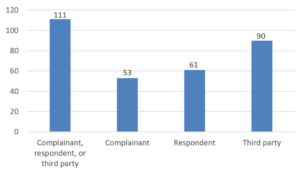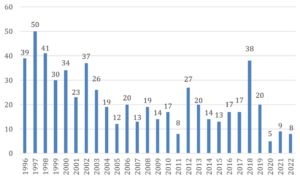
The World Trade Organisation’s dispute settlement system had its share of successes in fostering predictable trade flows through impartial adjudication, but many of its vulnerabilities have been exposed in recent years. The paralysis of the appellate body, triggered by the United States’ objections to reappointments, has cast a shadow over the WTO’s effectiveness. Can the WTO dispute settlement mechanism adapt to contemporary challenges like digital commerce and environmental concerns, or will its future depend on a reform agenda that addresses concerns of bias and inefficiency?
The organisational structure of the WTO is led by the ministerial conference which includes all member countries and meets at least once every two years. The General Council of the WTO, composed of all members, oversees the operation of WTO agreements and the implementation of ministerial decisions. There are also councils for trade in goods, trade in services, and trade-related aspects of intellectual property rights, along with committees on trade and development, balance of payments, and budget, finance, and administration. The WTO also has a Trade Policy Review Body (TPRB) and, the Dispute Settlement Body (DSB), often referred to as the “jewel” of the WTO.
READ I Food security debate at WTO – Balancing needs, mitigating risks
WTO dispute resolution system
The WTO not only serves as a platform for dispute resolution but also plays a crucial advisory role, offering technical assistance and training for developing, least-developed, and transition economy countries. This support helps these nations to improve their trading capacities and better understand and implement WTO agreements.
Five methods of conflict resolution include accommodation, compromise, avoidance, competition, and collaboration. The most common forms of dispute resolution in civil cases are mediation, settlement conferences, neutral evaluation, and arbitration. The Appellate Body, composed of seven members appointed by the DSB, serves four-year terms, with the possibility of reappointment. Members are appointed by consensus.
From its establishment in 1995 until the end of 2022, the WTO had seen 622 disputes, with over 493 panel reports and numerous arbitral decisions. The United States has initiated 115 dispute settlement cases and been a respondent in 13, while the European Union has initiated 97 cases and been a respondent in 84. Other active participants in dispute settlements include Canada, China, India, Brazil, Argentina, Japan, Mexico, and Korea.
Participation of WTO members in dispute settlement (1995 – 2022)

Requests for consultations (1995 – 2022)

The WTO’s dispute settlement mechanism has had a profound impact on global trade practices, ensuring that trade flows smoothly, predictably, and freely as possible. This system has been instrumental in mitigating trade tensions and fostering a more stable and predictable trading environment, which is essential for the growth and development of global economies.
The dispute settlement system has faced significant challenges, such as the United States challenging India’s export subsidies on various products and India imposing counter duties in response to U.S. tariffs. These challenges highlight the system’s importance and the complexities of international trade disputes. The WTO’s Dispute Settlement Body has been a critical mechanism for resolving trade and non-trade issues since the organisation’s inception.
Despite its successes, the WTO faces ongoing challenges and criticisms, including allegations of bias towards wealthier nations, inefficiencies in handling disputes, and difficulties in adapting to modern trade issues such as digital commerce and environmental concerns. These challenges highlight the need for continual reform and adaptation within the WTO to remain relevant and effective in the evolving global trade landscape.
In 2022, a Geneva Ministerial Conference aimed to resurrect the WTO’s dispute settlement system by 2024, as its collapse had rendered the WTO ineffective. Despite efforts by twenty developing countries in New Delhi, revival of the system remains a challenge.
The proposal for an International Trade Organisation (ITO) alongside the IMF and IBRD was initially opposed by the USA, leading to the creation of the WTO with broader powers. The effectiveness of the WTO’s dispute settlement process, providing equitable resolutions, has occasionally been at odds with U.S. interests, leading to tensions over the reappointment of panel members.
The future of the WTO hinges on its ability to evolve and address contemporary trade issues, including digital trade, environmental sustainability, and the economic impacts of global crises. Strengthening the organisation’s capacity to manage these challenges will be crucial for maintaining its role as a pillar of the international trading system.
For the global trading system to function smoothly, a robust and fair dispute settlement mechanism is essential. It is hoped that global powers will cooperate to restore a fully functional dispute settlement system to promote global trade and development.
Dr Ravindran AM is an economist based in Kochi. He has more than three decades of academic and research experience with institutions such as CUSAT, Central University of Kerala, Cabinet Secretariat - New Delhi, and Directorate of Higher Education Pondicherry.


